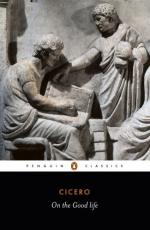|
This section contains 471 words (approx. 2 pages at 400 words per page) |

|
On the Good Life Summary & Study Guide Description
On the Good Life Summary & Study Guide includes comprehensive information and analysis to help you understand the book. This study guide contains the following sections:
This detailed literature summary also contains Topics for Discussion and a Free Quiz on On the Good Life by Cicero.
Cicero was one of the greatest philosophers, statesmen and orators of classical antiquity. He came to great renown during the late Roman Republic and the early rule of Caesar about 60 to 40 years before Christ. He was well-known not merely for his Roman consulship but for his intellectual writings. Philosophy was not as common amongst the Romans as it was among the Greeks. Cicero was significant not only for reviving Greek thought but for developing his own philosophical ideas (although they stayed rather close to Greek thinking). He also popularized philosophy amongst the Roman elites. Cicero's influence extends far beyond his death, however, throughout the late Roman Empire, the medieval period, the Renaissance and on to the present day.
On the Good Life is not a single book written at a single time. Instead, it is a compilation of several essays that Cicero wrote over the course of his life. Many of these essays are "books" within larger works, the other books excerpted elsewhere. On the Good Life contains five chapters. The first, Book V of "Discussions at Tusculum," is a dialogue that Cicero wrote between himself and a friend on the nature of happiness. Cicero is concerned to argue in favor of the Stoic view of happiness. The Stoics held that happiness could not be disrupted in order for it to be perfect. This meant training oneself to become emotionally indifferent to the loss of any external good, including friends and family. The second chapter, Book II of "On Duties," covers the character of the statesman. Cicero is horrified at the demise of the Roman republic and writes On Duties to show that the character of the statesman must be such as to preserve stability within a regime. A tyrant cannot have this character, he argues. The third chapter, "Laelius: On Friendship," is a dialogue that Cicero claims he received from his teacher Quintus Mucius Scaevola. Cicero claims that Scaevola and Gaius Finnius had this conversation with Gaius Laelius Sapiens, who had a famous friendship with Scipio Africanus the Younger. The dialogue concerns what Laelius learned from his legendary friendship with Scipio. The fourth chapter, "On the Orator," is the longest work. It is also a dialogue, which takes place as a debate between Lucius Licinius Crassus and Marcus Antonius Orator. Crassus argues that the orator must master all subjects, while Antonius argues that oratory requires little knowledge and needs mostly the ability to persuade. The fifth chapter, "The Dream of Scipio" rounds out the book. It is quite short and concerns the dream of Scipio Africanus the younger who has a vision of his grandfather, Scipio Africanus the elder. Scipio the Elder shows him the higher spheres of reality and encourages him to focus on greatness and virtue rather than the petty things of the earth.
Read more from the Study Guide
|
This section contains 471 words (approx. 2 pages at 400 words per page) |

|



